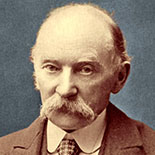 Thomas Hardy (June 2, 1840 – January 11, 1928) was an English novelist and poet.
Thomas Hardy (June 2, 1840 – January 11, 1928) was an English novelist and poet.
A Victorian realist in the tradition of George Eliot, he was influenced both in his novels and in his poetry by Romanticism, especially William Wordsworth. Charles Dickens was another important influence. Like Dickens, he was highly critical of much in Victorian society, though Hardy focused more on a declining rural society.
While Hardy wrote poetry throughout his life and regarded himself primarily as a poet, his first collection was not published until 1898. Initially, therefore, he gained fame as the author of novels, including Far from the Madding Crowd (1874), The Mayor of Casterbridge (1886), Tess of the d’Urbervilles (1891), and Jude the Obscure (1895). However, beginning in the 1950s Hardy has been recognised as a major poet; he had a significant influence on the Movement poets of the 1950s and 1960s, including Philip Larkin.
Most of his fictional works – initially published as serials in magazines – were set in the semi-fictional region of Wessex. They explored tragic characters struggling against their passions and social circumstances. Hardy’s Wessex is based on the medieval Anglo-Saxon kingdom and eventually came to include the counties of Dorset, Wiltshire, Somerset, Devon, Hampshire and much of Berkshire, in southwest and south central England.
AFTERWARDS
Thomas Hardy
When the Present has latched its postern behind my tremulous stay,
And the May month flaps its glad green leaves like wings,
Delicate-filmed as new-spun silk, will the neighbours say,
‘He was a man who used to notice such things’?
If it be in the dusk when, like an eyelid’s soundless blink,
The dewfall-hawk comes crossing the shades to alight
Upon the wind-warped upland thorn, a gazer may think,
‘To him this must have been a familiar sight.’
If I pass during some nocturnal blackness, mothy and warm,
When the hedgehog travels furtively over the lawn,
One may say, ‘He strove that such innocent creatures should come to no harm,
But he could do little for them; and now he is gone.’
If, when hearing that I have been stilled at last, they stand at the door,
Watching the full-starred heavens that winter sees
Will this thought rise on those who will meet my face no more,
‘He was one who had an eye for such mysteries’?
And will any say when my bell of quittance is heard in the gloom
And a crossing breeze cuts a pause in its outrollings,
Till they rise again, as they were a new bell’s boom,
‘He hears it not now, but used to notice such things’?
========
NEUTRAL TONES
Thomas Hardy
We stood by a pond that winter day,
And the sun was white, as though children of God,
And a few leaves lay on the starving sod;
—They had fallen from an ash, and were gray.
Your eyes on me were as eyes that rove
Over tedious riddles of years ago;
And some words played between us to and fro
On which lost the more by our love.
The smile on your mouth was the deadest thing
Alive enough to have strength to die;
And a grin of bitterness swept thereby
Like an ominous bird a-wing …
Since then, keen lessons that love deceives,
And wrings with wrong, have shaped to me
Your face, and the God-curst sun, and a tree,
And a pond edged with grayish leaves.